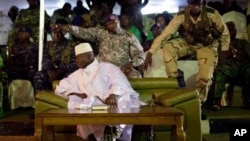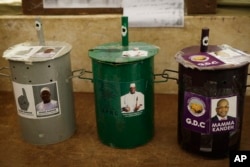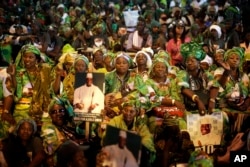Gambia's president of more than two decades is warning that even peaceful protests will not be permitted after Thursday's election, a move that comes as people are for the first time speaking out more freely against President Yahya Jammeh's rule.
The 51-year-old, who took control of this small West African country in 1994, raised his hands in the air before thousands of singing and dancing supporters at his final campaign rally late Tuesday.
Jammeh has said his victory is all but assured with divine intervention, and warned the opposition against protesting.
“Our election system is fraud-proof, rig-proof, you cannot rig our elections,” he said. “There is no reason that anybody should demonstrate.”
Demonstrations will not be allowed “because those are the loopholes that are used to destabilize African governments,” he said.
Jammeh in power since 1994
Jammeh's supporters praise his efforts to boost economic development in the tiny country that is dependent on tourism and agriculture.
“He has built the airport, schools, medical facilities and buildings,” said 50-year-old Pinta Manneh, smiling with excitement for the man she was certain would be re-elected for a fifth term. She couldn't imagine an opposition victory. “He will be angry if he loses,” she said.
Jammeh came to power in a coup in 1994, and then swept elections in 1996, 2001, 2006 and 2011, after a 2002 constitutional amendment removed presidential term limits. Critics, though, say those elections were not free and fair, and they accuse his regime of corruption and human rights abuses.
Gambia has seen a large exodus of its citizens trying to migrate to Europe on dangerous water routes in recent years. Jammeh says such migration is a matter of choice, and that Gambians do not leave because of poverty.
Voters to use marbles
On Thursday, more than 880,000 registered voters will head to more than 1,400 polling stations around the country. The sliver of a country, surrounded by Senegal and a small Atlantic coastline, has a population of about 1.9 million.
Jammeh faces off against Adama Barrow, a former businessman and United Democratic Party leader, who emerged as the candidate for an alliance of eight opposition parties. Former ruling party deputy Mama Kandeh is running for the Gambia Democratic Congress, the only opposition party not in the coalition.
Voters will use marbles, placing them into green, silver and purple ballot drums, which will be counted on the spot using wooden tablets. Observers from the European Union and the West African regional bloc ECOWAS are not attending the vote, though the African Union will send a handful of observers.
Protesters detained
Security forces arrested dozens in April and May after protests calling for electoral and political reforms. Two main opposition party members died in detention after the protests, and 15 opposition supporters are now serving three-year prison sentences.
That clampdown, however, has not stymied an excited opposition coalition.
“It's been impressive to see that there have been so many people willing to claim their rights, and to speak out and campaign, and do so freely during these two weeks,” said Stephen Cockburn, Amnesty International's deputy regional director for West and Central Africa. “Our fear is the freedom that has been allowed, that has been claimed and used, will stop.”
“We need change”
Isatou Jadama, 26, was among the thousands of opposition supporters lining the streets this week.
“We need change for our country, and a good leader,” Jadama said.
Omar Amadou Jallow, an emblematic opposition leader for the People's Progressive Party, which joined the coalition, agreed that this is the year for change.
“For 22 years we have realized that Gambia has been turned into a prison; the arrests, the tensions, the torture and many of our people have gone into exile ... That shows the tyranny of the regime,” he said. “We are going to give people their freedoms, their liberties. That is more important than anything else.”






